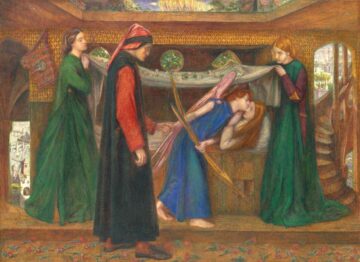Nick Ripatrazone in Humanities:
 The Latin renders to “who is blessed for ever” and concludes an enigmatic, brief paragraph. First published in 1294, La Vita Nuova is a tantalizing prelude to the Florentine poet’s masterpiece, La Commedia, known today as The Divine Comedy. For centuries, readers and scholars have pored over La Vita Nuova (Italian for, literally, the new life)—convinced, as we often are, that a gifted writer’s nascent work contains the answers to longstanding mysteries.
The Latin renders to “who is blessed for ever” and concludes an enigmatic, brief paragraph. First published in 1294, La Vita Nuova is a tantalizing prelude to the Florentine poet’s masterpiece, La Commedia, known today as The Divine Comedy. For centuries, readers and scholars have pored over La Vita Nuova (Italian for, literally, the new life)—convinced, as we often are, that a gifted writer’s nascent work contains the answers to longstanding mysteries.
La Vita Nuova’s ultimate paragraph follows a sonnet that Dante wrote for “two gracious ladies” of “noble lineage.” The poem begins: “Beyond the widest of the circling spheres / A sigh which leaves my heart aspires to move.” The sigh was a heavy one; a protracted sigh, in fact, that Dante had exhaled for much of his life. “As it nears / Its goal of longing in the realms above / The pilgrim spirit sees a vision”—a vision of Beatrice, the woman he loved for much of his life. “This much,” the sonnet concludes, “I know well.”
Dante finishes La Vita Nuova by describing that his sonnet was followed by “a marvellous vision in which I saw things which made me decide to write no more of this blessed one until I could do so more worthily.” Dante promises that he will write toward her glory, “as she indeed knows,” and he prays that God will grant him enough years so that he can “compose concerning her what has never been written in rhyme of any woman.” Even more, Dante prays—he pleads—that “my soul may go to see the glory of my lady, that is of the blessed Beatrice, who now in glory beholds the face of Him.” As in much of Dante’s work, it is both humble and ambitious: The poet wished to join his beloved in eternity while affirming that she is in sight of the divine. The request concludes with that Latin phrase, appended with a bit of mystery: Is it God who is blessed forever, or is it Beatrice?
Was there a meaningful distinction between the two—for Dante?
More here.
